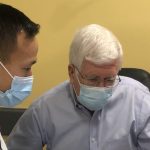Adjusting to unexpected vision loss can be immensely difficult. At Mass Eye and Ear, patients and families are offered short-term psychotherapy to receive guidance and learn coping skills while adapting to a new reality.
It’s critical to recognize the significant effects that vision loss, whether from a traumatic eye injury or a progressive or sudden illness, can have on mental health and impact the lives of patients and their loved ones.
Mass Eye and Ear’s Ocular Trauma and Vision Rehabilitation services recognize the psychosocial needs of patients after experiencing eye trauma or vision loss by connecting each patient in need with clinical psychologist, Ethan Lester, PhD.
Focus spoke with Dr. Lester to learn how psychotherapy is important after a vision-impacting event and to find out more about his clinical practice within Mass Eye and Ear.
Introduction to Short-term Psychotherapy
Adjusting to life with eye trauma or vision loss can be very challenging and patients need support to guide them through these difficult times.
“Patients are learning how to live with a new discomfort or a functional impairment that limits them from living the way they once knew,” said Dr. Lester.
Regardless of the level of vision loss or injury, patients will almost always have to take time off from work, reduce activity level and change their daily lifestyle, and in most cases, need assistance from their family or friends that they never needed before.
“With this immense amount of change, emotional distress can be managed by participating in short-term psychotherapy,” Dr. Lester said.
Psychotherapy is a general term for treatment techniques for mental health or stress-related problems, with a goal to help a patient respond to challenging situations and learn healthy coping skills.
Dr. Lester’s clinic at Mass Eye and Ear is a unique resource that offers patients expedited, short-term psychosocial care after an acute injury or a progressive illness.
For both ocular trauma and vision loss patients, the treatment plans are very focused; concentrating on learning new coping mechanisms and figuring out the correct resources needed to live life to the fullest.
“My clinic is a great way for people to be introduced to psychotherapy care in the context of a major life event, but it is not a stand-in for long-term psychotherapy,” Dr. Lester pointed out.
If a patient needs psychotherapy for more than learning skills to adjust to vision loss or trauma, or needs medication management, Dr. Lester refers them to the proper resources, such as a mental health professionals in the community.
How the Clinic Operates within Mass Eye and Ear
All ocular trauma patients at Mass Eye and Ear will be referred by their physician for a distress screening within a week of the eye injury. Once the referral is in place, Dr. Lester reviews the patient’s medical chart and consults with the physician to ensure he is not missing any critical information. If the patient is a candidate for psychotherapy, his administrative assistant Molly Mullen (who Dr. Lester says is the reason his clinic runs so smoothly), schedules their appointment.
“Just about every person 18 or older who passes through the ocular trauma clinic are going to have some interaction with me,” shared Dr. Lester. “The initial screening is a new standard of care we’ve implemented to guarantee that all patients receive the resources they need.”
Once an appointment is scheduled, Dr. Lester meets with the patient and his or her family for an initial evaluation to learn about any past psychological diagnoses/issues and how everyone intends to adapt to their new situation. It is very common for patients to have challenges adjusting to life after eye trauma, he noted.
After his initial screening, he decides if a patient would be a candidate for a focused psychotherapy treatment plan. Some patients express that they’re not interested in psychotherapy, while others don’t screen for adjustment issues for him to consider treatment clinically necessary. However, for patients who do qualify, he will set up a working treatment plan for the patient (and family if interested), starting with four to six 45-minute sessions.
Dr. Lester connects with the treating physician after each screening to update whether the patient will move forward with a treatment plan or if it was not necessary.
“I always tell the physician that I’m happy to ‘stay on a patient’s chart’ so that if something comes up in the future, they can speak with me,” said Dr. Lester “And we absolutely have patients come back at later times.”
Patients from Mass Eye and Ear’s Vision Rehabilitation Service are screened differently, based on an evaluation from their clinicians and a score the patient receives from a measure used in their clinic to determine how well the patient is coping with vision loss and the patient’s quality of life.
Similarly, Dr. Lester stays connected with the Vision Rehab clinicians to provide updates on their patients’ treatment plans and growth.
Utilizing this Unique Resource
Dr. Lester dedicates two days each week (Mondays and Fridays) to conducting psychotherapy sessions for patients and their families. On both days, he sees anywhere from three to six patients between the hours of 8am through 2pm.
The majority of his counseling is done through telemedicine; however, he always will hold an in-person session if that is preferred by a patient. Many patients prefer telemedicine, according to Dr. Lester, as it reduces the burden of commuting to the hospital. Although the more traditional telemedicine involves a video call, many of his patients have visual impairments, so he also offers a telephone call to help minimize screen time.
Both patients and families are encouraged to participate in Dr. Lester’s sessions as his objective is to provide a treatment plan that will help the whole family adjust to this new reality. Studies show that a short-term psychotherapy approach is effective for reducing distress and increasing resiliency in patients and caregivers.
Dr. Lester finds the work he does at Mass Eye and Ear enjoyable and incredibly rewarding. “My number one goal is to be of service to the patient, meet them where they’re at and give them the tools and resources to get through a challenging time,” said Dr. Lester. “We all hope that offering this resource to our patients can help take the stigma out of seeking mental health care and addressing emotional distress proactively versus reactively.”
His clinic, in addition to the Social Work Department which handles all inpatient visits, emphasizes the importance of treating a patient’s mental health in the aftermath of a life-changing event that lands them at Mass Eye and Ear.
“There is a clear mental health crisis throughout the world, and I am proud to be a part of a hospital that is taking action to help its patients,” said Dr. Lester.
For the ongoing support for this clinical initiative at Mass Eye and Ear, special thanks and recognition to the Chief of Ophthalmology, Joan W. Miller, MD, Senior Vice President of Ophthalmology, Debra Rogers, Director of Ophthalmology Operations, Jonathan Mazzone, Director of Ophthalmology Residency Training Program, Alice Lorch, MD, previous and current Ocular Trauma Chief Residents, Grayson Armstong, MD, MPH, Marisa Tieger, MD, Margot Weinert, MD and Neal Patel, MD, the Mass Eye and Ear Vision Rehab team, Kevin Houston, OD, Patrick Lee, OD, and Calliope Galatis, OD and Dr. Lester’s administrative assistant, Molly Mullen.



